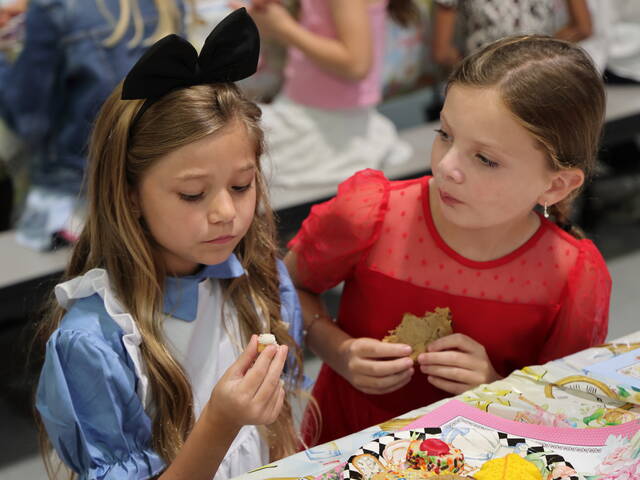https://triblive.com/news/education-classroom/bethel-park-school-district-program-promotes-reading-relatability/
Bethel Park School District program promotes reading relatability

Many may remember receiving school reading assignments and not particularly enjoying them or being able to process the necessary content in time for the exam a few days later.
Thanks to a program called Core Knowledge Language Arts, Bethel Park School District students have an opportunity to become more invested in what they’re reading.
For example, third graders at Benjamin Franklin Elementary School celebrated wrapping up their initial CKLA unit with an “Alice’s Adventures in Wonderland”-style tea party. The Lewis Carroll classic was one of three books they read from the start of the academic year through mid-September, along with Kenneth Grahame’s “The Wind in the Willows” and the folk tale “Aladdin and the Magical Lamp.”
“We find that students don’t have a lot of experience with these types of stories,” teacher Lindsay Crowley said. “Students aren’t familiar with nursery rhymes or old-fashioned tales like they used to be. So having the tea party is something that kind of brings that to life a little bit and gives them that experience.”
In addition to reading the books, the youngsters took deeper dives into various facets of each.
“Throughout the unit, we looked at different literary elements, such as dialogue, narration, setting, characters and plot,” Laura Glomb, another third-grade teacher, said. “The students also had an opportunity to explore the writing process. We wrote opinion paragraphs with a certain character and a certain theme in ‘The Wind in the Willows.’ ”
During the tea party, many of the students wore Mad Hatter-type headwear, often labeled “10/6” to indicate the 10 shillings and six pence it cost to buy a hat in England in the 1860s, around the time Carroll wrote his fanciful tales involving the White Rabbit, Cheshire Cat, Red Queen and others.
And many of the girls donned knee-length, full-skirt dresses to the soiree, similar to what illustrations show Alice wearing.
“Not every unit in CKLA renders itself a celebration of this magnitude,” Glomb said. “But with it being the first one, we saw it as an opportunity to celebrate and to excite them even further.”
Later units will cover nonfiction topics such as animal classification, planets, the human body, light and sound, Roman and Viking mythology, world explorers and Colonial America.
“When we get into the nonfiction topics, you would be surprised at what kids of this level can absorb and retain,” Crowley said. “They really get interested in it. And some of the things, even in the younger grades, seem like, well, there’s no way first, second and third graders are going to be able to remember this. But they do. They really latch onto it.”
And the learning process, she explained, takes more than just a couple of days.
“These are longer units,” she said. “Each one lasts about a month, and students really connect to it a lot more than just to take a test on Friday.”
Copyright ©2026— Trib Total Media, LLC (TribLIVE.com)
